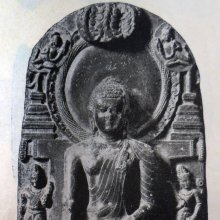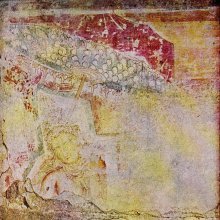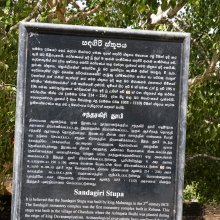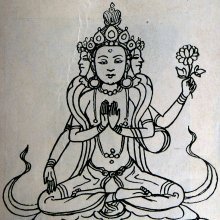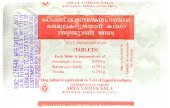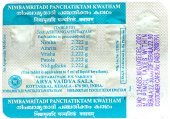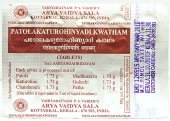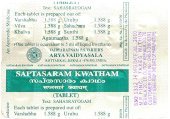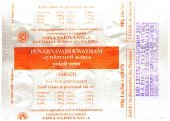Us, Ush, Uṣ, Ūṣ: 12 definitions
Introduction:
Us means something in Hinduism, Sanskrit, Hindi, biology, Tamil. If you want to know the exact meaning, history, etymology or English translation of this term then check out the descriptions on this page. Add your comment or reference to a book if you want to contribute to this summary article.
The Sanskrit terms Uṣ and Ūṣ can be transliterated into English as Us or Ush, using the IAST transliteration scheme (?).
Images (photo gallery)
(+5 more images available)
In Hinduism
Vyakarana (Sanskrit grammar)
Source: Wikisource: A dictionary of Sanskrit grammar1) Us (उस्).—Substitute for झि (jhi) ending of the third pers.plu., in the perfect tense and in the present tense in the case of the roots विद् (vid) and ब्रू (brū), e.g. विदुः (viduḥ) and आहुः (āhuḥ) cf. P. III.4.82-84 ;
2) Us.—Substitute जुस् (jus) (उस् (us)) for झि (jhi) in the potential and the benedictive moods, as also after the aorist sign स् (s) and after roots of the third conjugation, roots ending in आ (ā) and the root विद् (vid), e. g. पचेयुः भूयासुः अकार्षुः, अबिभयुः अदुः, अविदुः (paceyuḥ bhūyāsuḥ akārṣuḥ, abibhayuḥ aduḥ, aviduḥ), etc.; cf. Kāś. on III.4.108-112.

Vyakarana (व्याकरण, vyākaraṇa) refers to Sanskrit grammar and represents one of the six additional sciences (vedanga) to be studied along with the Vedas. Vyakarana concerns itself with the rules of Sanskrit grammar and linguistic analysis in order to establish the correct context of words and sentences.
Biology (plants and animals)
Source: Google Books: CRC World Dictionary (Regional names)Us in India is the name of a plant defined with Saccharum officinarum in various botanical sources. This page contains potential references in Ayurveda, modern medicine, and other folk traditions or local practices It has the synonym Saccharum officinarum var. otaheitense Roem. & Schult. (among others).
Example references for further research on medicinal uses or toxicity (see latin names for full list):
· Flore des Antilles (1808)
· Flore de la Polynésie Française (1892)
· Enumeratio Plantarum Omnium Hucusque Cognitarum (1833)
· Revised Handbook to the Flora of Ceylon (1900)
· Adnotationes Botanicae (1829)
· USDA Handb. (1958)
If you are looking for specific details regarding Us, for example diet and recipes, pregnancy safety, side effects, health benefits, chemical composition, extract dosage, have a look at these references.

This sections includes definitions from the five kingdoms of living things: Animals, Plants, Fungi, Protists and Monera. It will include both the official binomial nomenclature (scientific names usually in Latin) as well as regional spellings and variants.
Languages of India and abroad
Sanskrit dictionary
Source: DDSA: The practical Sanskrit-English dictionaryUṣ (उष्).—1 P. (oṣati, uvoṣa, oṣāñcakāra, oṣita-uṣita-uṣṭa)
1) To burn, consume; ओषाञ्चकार कामाग्निर्दशवक्त्रमहर्निशम् (oṣāñcakāra kāmāgnirdaśavaktramaharniśam) Bhaṭṭikāvya 6.1,14.62; Manusmṛti 4.189.
2) To punish, chastise; दण्डेनैव तमप्योषेत् (daṇḍenaiva tamapyoṣet) Manusmṛti 9.273.
3) To kill, injure.
--- OR ---
Ūṣ (ऊष्).—1 P. (ūṣati, ūṣita) To be diseased or disordered; be ill.
Source: Cologne Digital Sanskrit Dictionaries: Shabda-Sagara Sanskrit-English DictionaryUṣ (उष्).—[uṣa] r. 1st cl. (oṣati) To burn. (u,) uṣu (oṣati) To kill or injure: with pra prefixed, this root makes proṣati, &c.
--- OR ---
Ūṣ (ऊष्).—[ūṣa] r. 1st cl. (ūṣati) To be diseased or disordered.
Source: Cologne Digital Sanskrit Dictionaries: Benfey Sanskrit-English DictionaryUṣ (उष्).—i. 1, [Parasmaipada.] 1. To burn; to burn up, [Mānavadharmaśāstra] 4, 189. 2. To chastise, [Mānavadharmaśāstra] 9, 273.
— Cf. [Latin] uro prurire; [Old High German.] usilvar, yellow, probably [Latin] aurum.
— Cf. 2. vas.
--- OR ---
Ūṣ (ऊष्).—ii. 1, [Parasmaipada.] To be diseased.
Source: Cologne Digital Sanskrit Dictionaries: Cappeller Sanskrit-English DictionaryUṣ (उष्).—1. oṣati & uṣṇāti burn, consume, destroy, punish.
--- OR ---
Uṣ (उष्).—2. [feminine] dawn, morning.
Source: Cologne Digital Sanskrit Dictionaries: Monier-Williams Sanskrit-English Dictionary1) Uṣ (उष्):—1. uṣ [class] 1. [Parasmaipada] (connected with 3. vas q.v.) oṣati, oṣāṃ-cakāra, and uvoṣa ([Pāṇini 3-1, 38]; 3. [plural] ūṣuḥ, [Kāśikā-vṛtti on Pāṇini 6-4, 78]), oṣitā, oṣiṣyati, auṣīt, [Dhātupāṭha xvii, 45] : [class] 9. [Parasmaipada] (p. uṣṇat, [Ṛg-veda ii, 4, 7])
—to burn, burn down (active), [Ṛg-veda; Atharva-veda; Śatapatha-brāhmaṇa; Manu-smṛti iv, 189; Śiśupāla-vadha];
—to punish, chastise, [Manu-smṛti ix, 273] :—[Passive voice] uṣyate, oṣāṃ-cakre, to burn (neuter), [Suśruta; Caraka; Bhaṭṭi-kāvya]
2) 2. uṣ f. (only as [genitive case] sg.) early morning, dawn, [Ṛg-veda; Atharva-veda xvi, 6, 6]
3) [plural] (uṣas tisraḥ morning, midday, and evening, [Ṛg-veda; viii, 41, 3.])
4) Ūṣ (ऊष्):—[class] 1. [Parasmaipada] ūṣati, ūṣāṃ-cakāra, ūṣitā, etc., to be sick or ill, [Dhātupāṭha xvii, 32.]
5) Uṣ (उष्):—[from vas] a See under √1 uṣ
Source: Cologne Digital Sanskrit Dictionaries: Yates Sanskrit-English Dictionary1) Uṣ (उष्):—(u) oṣati 1. a. To burn; to hurt.
2) Ūṣ (ऊष्):—ūṣati 1. a. To be diseased.
[Sanskrit to German]
Sanskrit, also spelled संस्कृतम् (saṃskṛtam), is an ancient language of India commonly seen as the grandmother of the Indo-European language family (even English!). Closely allied with Prakrit and Pali, Sanskrit is more exhaustive in both grammar and terms and has the most extensive collection of literature in the world, greatly surpassing its sister-languages Greek and Latin.
Hindi dictionary
Source: DDSA: A practical Hindi-English dictionaryUs in Hindi refers in English to:—(pro) oblique singular form of [vaha; use/~ko] to him..—us (उस) is alternatively transliterated as Usa.
...
Kannada-English dictionary
Source: Alar: Kannada-English corpusUś (ಉಶ್):—
1) [noun] a heavy and deep breath, with a hissing sound, (as from tiredness, deep disappointment etc.) 2. a sound made to scare animals.
2) [noun] a sound made to call a dog.
--- OR ---
Us (ಉಸ್):—
1) [noun] a heavy and deep breath, with a hissing sound, (as from tiredness, deep disappointment etc.) 2. a sound made to scare animals.
2) [noun] a sound made to call a dog.
3) [noun] ಉಸ್ ಉಸ್ ಅನ್ನು [us us annu] us us annu = ಉಸ್ಸೆನ್ನು [ussennu]; ಉಸ್ಸೆನ್ನಿಸು [ussennisu] ussennisu to make one undergo agony; to mete hardship to another; ಉಸ್ಸೆನ್ನು [ussennu] ussennu to sigh a deep breath as from tiredness, disappointment, etc. ಉಸ್ಸಪ್ಪ [ussappa] ussappa an utterance made from tiredness, disappointment, distress, etc.
Kannada is a Dravidian language (as opposed to the Indo-European language family) mainly spoken in the southwestern region of India.
See also (Relevant definitions)
Starts with (+861): Ucakam, Ucakkaiyar, Ucal, Ucalattam, Ucalattu, Ucalatu, Ucali, Ucalvari, Ucam, Ucanan, Ucanar, Ucar, Ucar-payarrukari, Ucaritam, Ucarkalam, Ucarparuvam, Ucatal, Ucatevi, Ucattunai, Ucatu.
Ends with (+1893): Abanus, Abelmoschus crinitus, Abelmoschus esculentus, Abelmoschus ficulneus, Abelmoschus moschatus, Abhibhush, Abhidush, Abhijush, Abhikrush, Abhikush, Abhiprush, Abhisusush, Abhitush, Abhraprush, Abhush, Abhyakrush, Abhyush, Abhyutkrush, Abnus, Abrus fruticulosus.
Full-text (+2349): Ushita, Ushana, Osha, Pratyusha, Ushapa, Usa, Ushman, Pratyush, Pratyushya, Asmatra, Nyush, Vyosha, Asmayu, Mamatashunya, Usma, Ushtra, Ushni, Aposh, Duratas, Ushah.
Relevant text
One of your search terms exceeds the minimun character amount per search term. This amount currently equals 2.
No search results for Us, Ush, Uṣ, Ūṣ, Uś; (plurals include: Ushes) in any book or story.
Related products
(+47 more products available)

